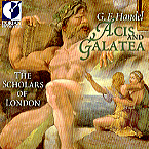Handel treated the story of Acis and Galatea in two different works, the first a “serenata a tre” written while in Italy in 1708, and the second (this one) a “masque” set to an English libretto written by none other than John Gay (of Beggar’s Opera fame). Handel composed this newer version in 1718 during his service to the Earl of Carnarvon (Duke of Chandos) and it went on to become far more popular than his Italian setting, which has entirely different music and, to my mind, is a superior work in every sense. Nevertheless, Handel is never a slouch when it comes to storytelling and theatrical presentation, and he rarely fails to provide inspired–or at least catchy–music for his singers and instrumentalists. He doesn’t disappoint here (even Mozart liked this work so much he provided his own orchestration for it). Owing to its chamber origins (it was first performed at the Duke’s residence) the piece is scored for four solo singers–Acis (tenor), Galatea (soprano), Damon (countertenor), and Polyphemus (bass)–and a small orchestra of four strings, a pair of oboes, recorder, flute, and harpsichord.
The tightly wrought drama contains some fine music, especially arias by Acis (“Love in her eyes sits playing”) and Galatea (“As when the dove laments her love”), their following, very lively duet (“Happy we!”), and the cleverly orchestrated “Hush, ye pretty warbling choir!” Soprano Kym Amps and tenor Robin Doveton are wonderful as the two lovers, with Amps notably alluring in her “As when the dove” aria. I would have equal praise for bass David van Asch except for his habit of articulating runs or melismas with an “h” before each note. Countertenor Angus Davidson gives a good, middle-of-the-road reading of the part of Damon, which is about right for the role and the music. This production uses a countertenor for Damon in keeping with Handel’s original 1718 performance; the same rationale is used to omit one of Damon’s arias (added for a later production), which conveniently allows the whole thing to fit onto one CD.
The recorded competition for this work is surprisingly sparse. If you want an excellent version of the complete score, go for the Hyperion recording (on two CDs), with Claron McFadden, John Mark Ainsley, and The King’s Consort. Interestingly, the other choice is a very respectable 1993 performance for Naxos with exactly the same singers who perform here, appearing as the Scholars Baroque Ensemble (also on one CD). The current Dorian release comes from a live 1991 performance in Spain. The sound is vibrant and well-balanced, and the recording only occasionally gives away its concert setting with a minor intonation lapse here, or a vocal imperfection there–nothing to worry about.
































